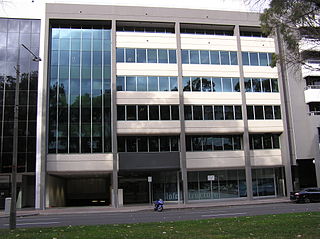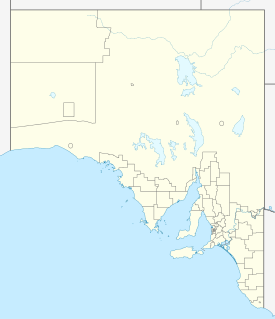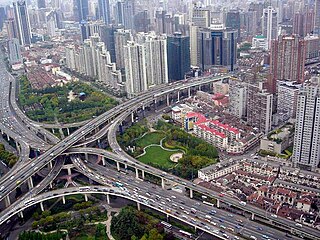
Lidar is a surveying method that measures distance to a target by illuminating the target with pulsed laser light and measuring the reflected pulses with a sensor. Differences in laser return times and wavelengths can then be used to make digital 3-D representations of the target. The name lidar, now used as an acronym of light detection and ranging, was originally a portmanteau of light and radar. Lidar sometimes is called 3D laser scanning, a special combination of a 3D scanning and laser scanning. It has terrestrial, airborne, and mobile applications.

Faisalabad, formerly known as Lyallpur, is the third-most-populous city in Pakistan, and the second-largest in the eastern province of Punjab. Historically one of the first planned cities within British India, it has long since developed into a cosmopolitan metropolis. Faisalabad was restructured into city district status; a devolution promulgated by the 2001 local government ordinance (LGO). The total area of Faisalabad District is 5,856 km2 (2,261 sq mi) while the area controlled by the Faisalabad Development Authority (FDA) is 1,280 km2 (490 sq mi). Faisalabad has grown to become a major industrial and distribution centre because of its central location in the region and connecting roads, rails, and air transportation. It has been referred to as the "Manchester of Pakistan". Faisalabad contributes over 20 percent of Punjab's GDP, and has an average annual GDP of $20.5 billion. Agriculture and industry remain its hallmark.

Zambia is divided into 10 provinces for administrative purposes. Each province is headed by a minister appointed by the President and there are ministries of central government for each province. The administrative head of the province is the Permanent Secretary, appointed by the President. There are Deputy Permanent Secretary, heads of government departments and civil servants at the provincial level.

The Philippines' Department of Public Works and Highways, abbreviated as DPWH, is the executive department of the Philippine government solely vested with the Mandate to “be the State's engineering and construction arm” and, as such, it is “tasked to carry out the policy” of the State to “maintain an engineering and construction arm and continuously develop its technology, for the purposes of ensuring the safety of all infrastructure facilities and securing for all public works and highways the highest efficiency and the most appropriate quality in construction” and shall be responsible for “(t)he planning, design, construction and maintenance of infrastructure facilities, especially national highways, flood control and water resources development systems, and other public works in accordance with national development objectives,” provided that, the exercise of which “shall be decentralized to the fullest extent feasible.”

The Department of Infrastructure, Regional Development and Cities is an Australian Public Service department of the Government of Australia charged with the responsibility for infrastructure and major projects, transport, local government, external territories administration, rural and regional development, population policy, and cities.

The Department for Infrastructure is a devolved Northern Ireland government department in the Northern Ireland Executive. The minister with overall responsibility for the department is the Minister for Infrastructure.

The Northern Ireland Civil Service is the permanent bureaucracy of employees that supports the Northern Ireland Executive, the devolved government of Northern Ireland.

Bidhan Chandra Krishi Viswavidyalaya (BCKV), also known as Bidhan Chandra Agricultural University, is an agricultural university in West Bengal, India. The university aims to provide higher education in theoretical and technical fields of Agriculture, Horticulture and Agricultural Engineering. It grants Bachelor of Science, Master of Science, Bachelor of Technology, Master of Technology and Doctorate degrees and, thus, provides modern and high value education to create scientists with the capability to work at national and international levels.

Narendra Deva University of Agriculture and Technology is a university in Faizabad district of Uttar Pradesh (India) established in 1975. It is named after notable politician and educator Narendra Deva who served as vice chancellor of University of Lucknow. Besides Faizabad district, it also has campuses/constituent colleges in Ambedkar Nagar district and Azamgarh district who are fully functional and an upcoming in Gonda district.

Veer Bahadur Singh Purvanchal University, formerly Purvanchal University, is in Jaunpur, Uttar Pradesh. It was established in 1987 as a residential-cum-affiliating university. It is named after Shri Vir Bahadur Singh, the former chief minister of Uttar Pradesh.
Local Government Engineering Department (LGED) is an organ of Bangladesh government created for provision of transport infrastructures in rural areas and to provide technical support to the rural and the urban local government institutions (LGIs), planning and implementation of infrastructure development projects in the rural and urban areas to improve communication and transport network, job creation, and poverty reduction.

Chandannagore subdivision is an administrative subdivision of the Hooghly district in the state of West Bengal, India.

Krishnanagar II is a community development block that forms an administrative division in Krishnanagar Sadar subdivision of Nadia district in the Indian state of West Bengal.

Ranaghat I is a community development block that forms an administrative division in Ranaghat subdivision of Nadia district in the Indian state of West Bengal.

Chakdaha is a community development block that forms an administrative division in Kalyani subdivision of Nadia district in the Indian state of West Bengal.

Bolpur Sriniketan is a community development block that forms an administrative division in Bolpur subdivision of Birbhum district in the Indian state of West Bengal.

Burdett is a locality in South Australia located on the eastern side of the Murray River about 3.5 kilometres to the east of the city of Murray Bridge and about 74 kilometres east south-east of the Adelaide city centre. Its name is derived from the Hundred of Burdett.

American Beach is a locality in South Australia on the north coast of Dudley Peninsula on Kangaroo Island overlooking Nepean Bay, about 115 kilometres south-west of Adelaide.

Kangaroo Head is a locality in the Australian state of South Australia located on the north coast of Dudley Peninsula on Kangaroo Island overlooking both Backstairs Passage and Nepean Bay about 110 kilometres south of the state capital of Adelaide.

The Border Roads Engineering Service, often abbreviated to B.R.E.S., or simply BRES is a prestigious Group 'A' central service recruited through the Engineering services examination by the Union Public Service Commission. The officers of this service are responsible for administering the Civil Engineering and Mechanical Engineering organisation of the Border Roads Organization, NHIDCL and NHAI. BRES is a Uniformed Engineering Service which is responsible for Engineering, Developmental and administrative works of Border Roads Organization. Currently BRO is working in 14 states including the union territory of Andaman & Nicobar. BRO is entrusted for construction of roads, bridges, tunnels, causeways, helipads and airfields along with their maintenance.
















